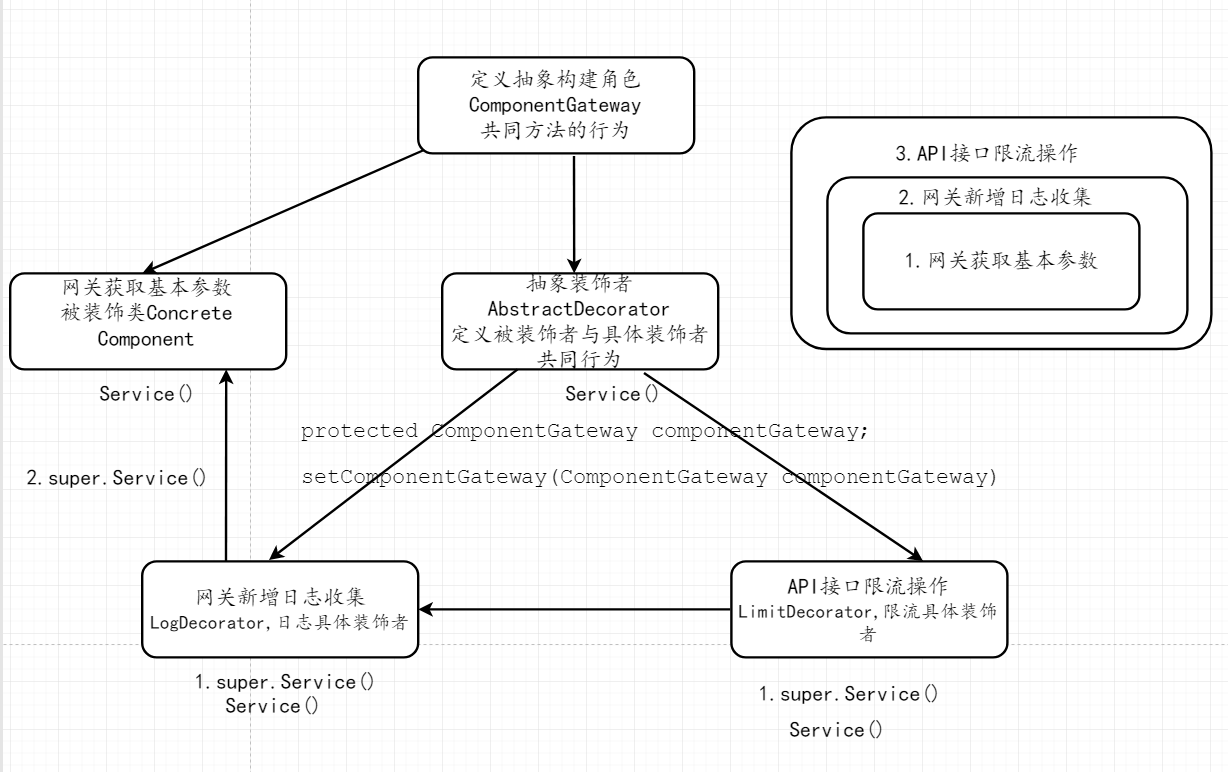笔记十 装饰器模式(Decorator Pattern)
1. 什么是装饰器模式 ?
装饰器模式(Decorator Pattern)
允许向一个现有的对象
添加新的功能,同时又不改变其结构。这种类型的设计模式属于
结构型模式,它是作为现有的类的一个包装。
生活版
例如:
- 孙悟空有 72 变,当他变成"庙宇"后,他的根本还是一只猴子,但是他又有了庙宇的功能。
- 不论一幅画有没有画框都可以挂在墙上,但是通常都是有画框的,并且实际上是画框被挂在墙上。在挂在墙上之前,画可以被蒙上玻璃,装到框子里;这时画、玻璃和画框形成了一个物体。
2. 饰器模式有什么作用?
在不改变原有对象的基础上功能附加功能,装饰器模式相比生成子类更为灵活。
3. 核心使用规则
1. 抽象组件:定义一个抽象接口,来规范准备附加功能的类。
2. 具体组件:将要被附加功能的类,实现抽象构建角色接口。
3. 抽象装饰者:持有对具体构件角色的引用并定义与抽象构建角色一致的接口。
4. 具体装饰:实现抽象装饰者角色,负责对具体构件添加额外功能。
4. 应用场景
5. 案例 1:网关添加功能

- 网关的基本功能:获取(拦截)基本参数
- 网关添加功能:
- 日志收集
- API 接口限流
1. 抽象组件
- 抽象组件:定义一个抽象接口,来规范准备附加功能的类。
- 创建一个抽象组件
GatewayComponent.java
java
package com.gateway.abstracts;
/**
* @Auther: Calvin
* @Date: 2019/5/15
* @Description: 网关组件(抽象类)
*/
public abstract class GatewayComponent {
/**
* 网关功能
*/
public abstract void function();
}2. 具体组件
- 基本功能:获取(拦截)基本参数。
java
package com.gateway.component;
import com.gateway.component.abstracts.GatewayComponent;
/**
* @Auther: Calvin
* @Date: 2019/5/15
* @Description: 网关基本实现类 (被装饰者)
*
*/
public class BaseComponent extends GatewayComponent {
@Override
public void function() {
System.out.println(">>>>>> 第一步:网关参数拦截,获取参数信息 >>>>>>");
}
}- 附加功能:日志采集
java
package com.gateway.component;
import com.gateway.component.abstracts.AbstractDecorator;
/**
* @Auther: Calvin
* @Date: 2019/5/15
* @Description: 日志采集(具体装饰角色)
*/
public class LogComponent extends AbstractDecorator {
@Override
public void function() {
// 调用装饰类service
super.function();
// 日志收集
System.out.println(">>>>>> 第二步:日志的采集 >>>>>>");
}
}- 附加功能:API 接口限流
java
package com.gateway.component;
import com.gateway.component.abstracts.AbstractDecorator;
/**
* @Auther: Calvin
* @Date: 2019/5/15
* @Description: 限流組件 (具体装饰角色)
*/
public class LimitComponent extends AbstractDecorator {
@Override
public void function() {
// 1.传递日志收集装饰类
System.out.println(super.getClass().toString());
super.function();
System.out.println(">>>>>> 第三步:API接口限流 >>>>>>");
}
}3. 抽象装饰者
- 作用:持有对具体构建角色的引用,并定义与抽象构件角色一致的接口
- 设置网关组件
java
package com.gateway.component.abstracts;
/**
* @Auther: Calvin
* @Date: 2019/5/15
* @Description: 抽象装饰者
* 作用:持有对具体构建角色的引用,并定义与抽象构件角色一致的接口
*/
public abstract class AbstractDecorator extends GatewayComponent {
protected GatewayComponent gatewayComponent;
public AbstractDecorator(){}
public AbstractDecorator(GatewayComponent gatewayComponent){
this.gatewayComponent = gatewayComponent;
}
/**
* 设置网关组件
*
* @param gatewayComponent 网关主键
*/
public void setGatewayComponent(GatewayComponent gatewayComponent) {
if (gatewayComponent != null) {
this.gatewayComponent = gatewayComponent;
}
}
@Override
public void function() {
gatewayComponent.function();
}
}4. 具体装饰
- 通过工厂设计具体装饰
java
package com.gateway.component.factory;
import com.gateway.component.BaseComponent;
import com.gateway.component.LimitComponent;
import com.gateway.component.LogComponent;
import com.gateway.component.abstracts.GatewayComponent;
/**
* @Auther: Calvin
* @Date: 2019/5/15
* @Description: 网关工厂获取装饰类,并控制执行顺序
*/
public class GatewayFactory {
public static GatewayComponent getGatewayComponent(){
// 1. 实例基础功能
BaseComponent baseComponent = new BaseComponent();
// 2. 在附加基础的功能上添加- 新增日志收集
LogComponent logDecorator = new LogComponent();
logDecorator.setGatewayComponent(baseComponent);
// 3. 在附加基础的功能上添加- 新增Api接口限流
LimitComponent limitDecorator = new LimitComponent();
limitDecorator.setGatewayComponent(logDecorator);
// 4. 执行顺序:新增Api接口限流 -> 新增日志收集 -> 网关基础功能
return limitDecorator;
}
}5. 编写测试接口
java
package com.gateway.controller;
import com.gateway.component.abstracts.GatewayComponent;
import com.gateway.component.factory.GatewayFactory;
import org.springframework.web.bind.annotation.GetMapping;
import org.springframework.web.bind.annotation.RequestMapping;
import org.springframework.web.bind.annotation.RestController;
/**
* @Auther: Calvin
* @Date: 2019/5/15
* @Description:
*/
@RestController
@RequestMapping("gateway")
public class GatewayController {
@GetMapping(value = "api")
public String api(){
GatewayComponent gatewayComponent = GatewayFactory.getGatewayComponent();
gatewayComponent.function();
return "success";
}
}6. 结果演示

7. 优缺点
优点:
可以不改变原有对象的情况下动态扩展功能,可以使扩展的多个功能按想要的顺序执行,以实现不同效果.
缺点:
更多的类,使程序复杂 .
